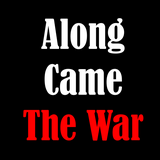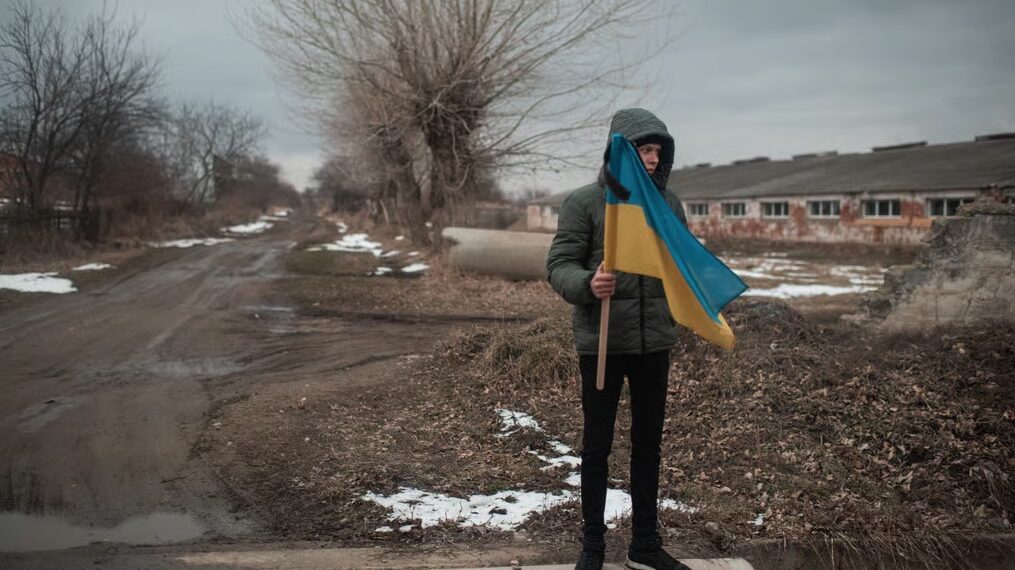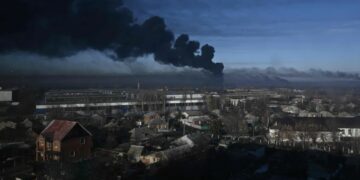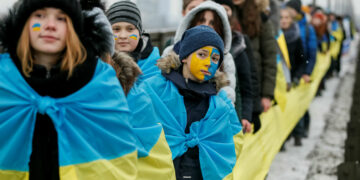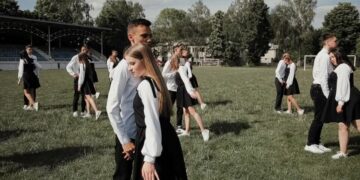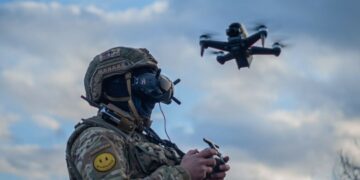How does violence shape our character? Can being a victim of cruelty make us cruel in return? And how does it fuel the feeling of fury? I posed these profound questions to my students, and their responses, collected here, offer a powerful and unflinching look into the human spirit under pressure. Writing against the devastating backdrop of the Russian invasion of Ukraine, their reflections move beyond the theoretical, grounding these complex issues in lived, daily experience.
While we agree that violence inevitably leaves a deep and lasting mark on a person’s inner world, their analyses of its effects are nuanced. They explore how trauma can lead some to aggression or isolation and describe the psychological scars of anxiety, depression, and PTSD. Yet, a powerful counter-narrative of resilience emerges. Instead of turning to a cycle of violence they describe channeling justified fury into community support, unity, and what one student powerfully terms “disciplined anger.” This anger becomes a tool for volunteering, serving, and fiercely guarding their humanity. These texts are a testament to a generation grappling with profound injustice while hardening their resolve to remain human, united, and just.
Olesya Lopatina:
I believe that violence truly influences our character. Its impact is especially strong when it happens in childhood, since that is the time when a person is discovering the world and absorbing everything around them. In such cases, cruel treatment may be perceived as acceptable, and a child can adopt this model of behavior, considering it a normal way of communication. If violence occurs later in life, the consequences depend on the individual’s personality: some may withdraw and isolate themselves from society, while others may seek revenge and use cruelty against others in the future, because they once experienced it themselves. At the same time, crime committed against us often awakens a strong feeling of fury toward those who hurt us or broke us. Therefore, violence can make a person either more aggressive or more closed off, but in any case, it leaves a deep mark on one’s inner world. In conclusion, violence shapes who we become, and whether it drives us toward anger or isolation, it always changes us in deep ways.
Maria Lysa:
The Russian invasion in Ukraine, Israeli-Palestinian conflicts and other have unleashed massive violence and trauma, significantly affecting the character and behavior of those impacted. Many people now struggle with psychological issues such as anxiety, depression, and PTSD, altering their perceptions of safety and trust. This environment of fear can lead some individuals to adopt aggressive behavior coping it and consequently, perpetuate the cycle of violence.
Exposure to ongoing conflict increases feelings of anger and makes confrontational behavior more likely as the way to express their pain and defend their identity in difficult situations. Desensitization also plays an important role here. When individuals are repeatedly exposed to violence, they can become numb to it, making aggressive actions seem more normal and acceptable. This numbness can lead to a higher chance of people engaging themselves in violence, as the line between acceptable and unacceptable behavior becomes less visible.
Furthermore, the long-term effects are serious. Without proper or adequate support, victims may continue the cycle of violence, contributing to the society if it accepts aggression. On the other hand, the wars and armed conflicts have also sparked resilience and unity among many citizens, who turn their experiences into community to support and help different people with the same problems or needs. Emotional responses frequently include intense fury directed towards aggressors, motivating resistance and uniting individuals in their struggle against oppression.
Mariia Sydorenko:
Russian violence against Ukrainians shapes our character, but rather than turning us into cruel people, it teaches us vigilance, solidarity, and moral clarity.
Violence definitely affects negative feelings in Ukrainians’ souls. It appears in many ways throughout the usual day. Starting at night, when their missiles attack civilian buildings, our homes, explosions don’t let us sleep properly. I have spent countless nights underground in shelters, or, when it was “calmer,” in the corridor or bathroom. Despite that, we wake up in the morning, bless the defense forces, and try to put ourselves back together to go on with our lives. While scrolling on social media, Ukrainians almost feel russian aggressive propaganda on their skin. They want us to die. All of us. It is difficult to stay calm and have peaceful intentions toward them, isn’t it?
Yes, these crimes spark fury. But what I see around me is not blind aggression, but disciplined anger. We channel it into volunteering, studying, serving, and telling the truth all around the world. The same nights without sleep that plant fear also plant resilience. The same sirens that break concentration also sharpen purpose. Right now, it is hard to imagine a near future with a different attitude toward those who did this. Although I believe people who didn’t pass through this hell won’t carry the same hardness as my contemporaries, I still hope these days are building a massive wall between the sensible world and that swamp. And on our side of the wall, we guard our humanity.
Therefore, while russian violence pressures our character and fuels justified fury, it does not doom Ukrainians to cruelty, but hardens our resolve to remain human, united, and just.
Solomia Myh-Pavlenko:
Truly speaking, my first reaction to those questions was, only a person who doesn’t know what it’s like to live during the war would ask that. Only those who haven’t seen photos of Bucha wouldn’t understand the growing feeling of destructive fear and anger inside your bones.
But then, I reconsidered. The truth is that those questions must be raised inside Ukrainian society. We ourselves must reflect better on what has happened and continues happening to our feelings, what kind of experiences we will have to deal with, and which coping mechanisms we have already developed. This growing anger and fury inside us is one of those coping mechanisms. So, when a young man who came back from the front line is aggressively and even hatefully complaining about neglectful civilians living their lives, he is just in fear and trauma. Same from the other side. And in my opinion, our problem is not in this aggression itself, but in the huge difference in experiences that military and civil society have. It will be hard to adapt both sides to each other after the war. Ukrainians are already drowning in radicalization and hatred. But it all comes from enormous exhaustion.
Marianna Zadachyna:
I’m not Jesus Christ to love people who actively try to murder me and destroy my country every day, but I also don’t have the time or mental capacity for constant aggression toward russians. Naturally, I might exclaim, “I hate them so much” when my plans are ruined once again because of air alerts, or when I learn about yet another horrific act they’ve committed in the past or present — but who wouldn’t in my position? It isn’t aggression to voice frustration about people who openly hold imperialistic views, whose propaganda spreads across the world, and whom that world is all too ready to believe despite the crimes they’ve committed. And it’s not as if I even engage with them online. Even though there’s a temptation to tell them exactly what their people have done and continue doing, aggression isn’t my priority — I have better things to do.
Yeva Lapatiuk:
Because of the violence we as Ukrainians are forced to go through in this war, we’ve become harder and rougher. And for me it is completely justified—it’s the only way to survive in such a world with these kinds of events. We have every right to be furious at Russians because they have done and still are doing everything to ruin our lives.
Polina Volodina:
I believe that violence ultimately strengthens the person. The thing is, people usually experience drastically different consequences of that “strength”. Someone might become overly aggressive, another person will learn how to endure, others will run away and hide. But there is strength in all of those reactions. We can’t say for sure that this war will make everyone cruel; I would even go as far as to say that many people have gained more emotional intelligence while dealing with the consequences of it. If anything, it teaches us empathy. Fury is a natural emotion in this case; it would be weirder if we weren’t furious—that means getting pent up with bad emotions. That’s worse, because then, we can burst at any moment. Experiencing anger while it happens is the best way of dealing with it, and right now, there’s many constant reasons for it. So we should have the space for that. It is normal to feel emotions, and with something as complex as our situation right now, we shouldn’t worry ourselves further with figuring out how to not be angry in the future. The focus shouldn’t be on how to suppress fury, but on how to deal with it after it happens, which is what therapists are for. Such experience, in the best outcome, will strengthen us to no limits, if properly dealt with.
Anastasia Nosevych:
Thereare plenty of types of violence that can affect our character in different ways. It is also often said that the traumatic experience a person has gone through in the past is never an excuse for their aggression and cruelty. However, if we talk about such a disaster as russian invasion of Ukraine, the amount of hate that we feel works not only as protection for our mental health but also motivates us to keep standing, volunteer, and tell our story.
Maria Maystrenko:
Violence makes us feel angry. Maybe not right after an act of violence had occurred, but definitely later in the process of reflecting on it. There are two ways in which a person’s character can react to this feeling of an extreme fury provoked by violence.
First one is – is a common saying that “violence begets violence”. Witnessing of living through an extreme violence, a person begins to express their own emotions in the same way. It can be harmful to others or to the person themselves.
The second – is being destroyed by it. Unable to handle their own emotional response to violence, a person becomes devastated. It makes them forget who they are, making their whole life about an act (or acts) of violence they have lived through.
Daria Kozlova:
While reflecting on my response, the thought occurred to me : Couldn’t we just say that the genuine nature of humanity is violent and aggressive?
I make this assumption based on the facts of world history: there has not been a single five-year period when humanity was not at war. Perhaps the “homosapiens” is doomed to spontaneous outbreaks of battle or ruthless murder because we are beasts with a thirst for bloodshed…
Why have we, the contemporaries of this era, decided that the evolution of ethical norms, prescriptions, and dogmas will overshadow the primal principle in human consciousness—to kill in order to survive?
As Tom Shippey aptly noted, “the psychopathy of the twenty-first century is not so different from the moderate prudence of the nineteenth.” What shocks our contemporaries most is how quickly what Nietzsche called a radical revaluation of all values occurs during war. War erases artificial narratives and lays bare the nerve.
Solomia Syvak:
First of all, it’s important not to underestimate the violence that is directed and was directed at us for at least 200 years. Generations were formed under the pressure of hate, and assuming that full scale war, which is one of the possible expressions of violence, barely affects us is naive. However, besides the anger, constant irritation, despair, and sadness that people feel daily in Ukraine, war shows us the importance of solidarity and partnership. When the war started in 2014, I was 6 years old. My friends and I were selling homemade lemonade to raise money for the Ukrainian army. I guess that’s how I was taught patriotism.
I think people always want justice. As it’s impossible to take revenge for the horror that we have been through, we tend to vent our anger unconsciously on others. It’s difficult to always be kind when you live in this kind of reality.
Of course I can speak only from my experience, but as far as I know everyone in my surroundings feels the same. It’s a logical response to the war crimes about which we read in the news every day. As I already mentioned, you can’t stay neutral in this situation. Furthermore, fury is not always a bad emotion. I managed to transform it into the motivation that helps me achieve things. I dream of shooting a movie and contributing to the cultural heritage of my country. I know russians dreams to exterminate Ukrainian culture; that’s what keeps me going.
Yaroslav Kryvko:
I believe that violence against a person is a very negative experience. Even if damage is physical, it can still have a strong mental impact. Firstly, the feeling of being hated so much that the other side is okay with using violence creates mental cracks in one’s perception of themselves. Secondly, the feeling of helplessness is known for being the primary cause of traumas. Traumas themselves are harmful for individuals because of the brain reliving the same negative experience over and over again and using coping mechanisms that protect the sanity but ruin many aspects of a person’s life. Furthermore, traumas can result in PTSD, which is a severe form of mental illness that has crushing consequences for one’s functioning capabilities.
Talking about war, we can see how people become aggressive towards the source of the violence. Violence creates feelings of hatred, which, unresolved, can eat people from the inside or can be poured on others. So yes, I believe that people are and will be more aggressive, though this aggression can go unnoticed because it isn’t always targeted at other people. On the other hand, I think that it really depends on a person and their life experience and genetics, so it isn’t easy to estimate what percent of people will be more aggressive, and whether this number is enough to say that overall people will be more aggressive and furious.
Sophia Holovko:
Unfortunately, many people from countries without war think that Ukrainians should not feel angry with russians for some reasons. But actually, if you study psychology, or at least you are interested in it, you see that it’s completely ok to feel anger about people that started such serious things in your country as war and genocide. Biologically people need anger to understand that their needs or safety are disturbed, and it gives them power to protect themselves, so it’s not a bad emotion, but of course we need to control it. I don’t think that such a fury will make Ukrainians uncontrollably cruel unless we forget that this anger is about our need to feel safe and happy in our country without russian invasion. We also can think about how we love other Ukrainians that do everything they can to make victory real, to help refugees, and so on, and I think that this feeling will make us remember the limits and the specific object of our anger.
We live in truly turbulent times. Who would have expected that the 21st century would be so “remarkable” in terms of events? Unfortunately, for the most part, this concept has a negative connotation.
The war in Ukraine has been going on for four years now, and every day people’s reactions to its conditions are gradually changing.
If we recall 2022, the beginning of the full-scale invasion, there was a sense of panic and confusion in the air. However, over time, fear has transformed into anger. And now, this emotion is increasingly noticeable among Ukrainians.
Anger at the “neighbours” who have violated the sovereignty of our state. Anger at people who have not yet identified their true enemies and continue to promote Russian culture to the masses. And even, partly, anger at themselves. After all, many Ukrainians believe that they are not doing enough for themselves, their families, or their country.
In my opinion, anger is a completely normal and natural reaction to an external stimulus. Especially when that stimulus, without exaggeration, tries to kill you every day.
But here it would be important to recall one telling phrase: “Whatever doesn’t kill us makes us stronger.” And indeed, we no longer have the fear that we had at the beginning. We are no longer confused. All that remains is anger, which is like a flame: it flares up as quickly as it goes out. So if no one adds fuel to this imaginary fire, it will go out, and our reality will finally return to the peace and comfort that so many people are lacking right now. Will this make us more aggressive in the future? Hardly. If there is no irritant, there will be no reason for aggression.
Yaroslav Vonsevych:
Each day for a Ukrainian teenager might be a turning point for the worst, but we still aspire to live our best lives and appreciate every moment.
A teenager, according to various sources, is a person ages 10 (or 13) to 19. Therefore, the experiences totally differ: an 11-year-old might barely remember their peaceful life, while older teens, including me, watched the full-scale invasion unfold in real time. Younger ones mostly don’t have a profound understanding of the situation; for example, they’re usually the ones watching russian content and ignoring the fact it monetizes rockets that later bomb our cities. My age group is, sadly, accustomed to war, so we plan our futures, hoping we won’t get killed the upcoming night. All that may sound wild to westerners, but those westerners also are the ones doing almost nothing about it.
Overall, the lives of Ukrainian teenagers nowadays are unpredictable. Some of us don’t remember the relatively peaceful times; some had gotten used to the constant shellings.
Mariia Lemeshchuk:
How violence against us influence our character? Is it possible that we will be cruel and aggressive in the future? Or now? Does crime against us impact the feeling of fury?Any violence leaves a permanent impact on people. Still, the consequences of russian aggression against the Ukrainian nation are being debated. To start with, Ukrainians have been accused of being too hateful. In our collective opinion, we have every right to have any reactions we feel like having. As well as that, it’s a well-known fact that not normal events provoke not normal responses. Our hatred is aimed exactly at 144 million creatures too lame to be called people. On the other hand, constant emotional pressure has its consequences: Ukrainians are now easily irritated and grumpy. Though we don’t usually project russia’s faults onto our close ones (except vatniks, who blame everyone and everything but the aggressor), communication with any Ukrainian affected by war might be emotionally challenging for, say, Europeans. In my opinion, we aren’t necessarily becoming crueler in general due to war, but it definitely impacts our emotions and mental health. As long as we remember who our enemies are, we won’t become evil by default. To sum up, we can’t know for certain what will become of us during and after the war. Although our mental stability is definitely deteriorating, if we aim our hatred in the right direction and express it in healthy ways, we aren’t at risk of being in a state of constant aggression.
